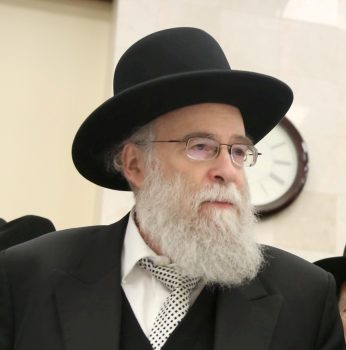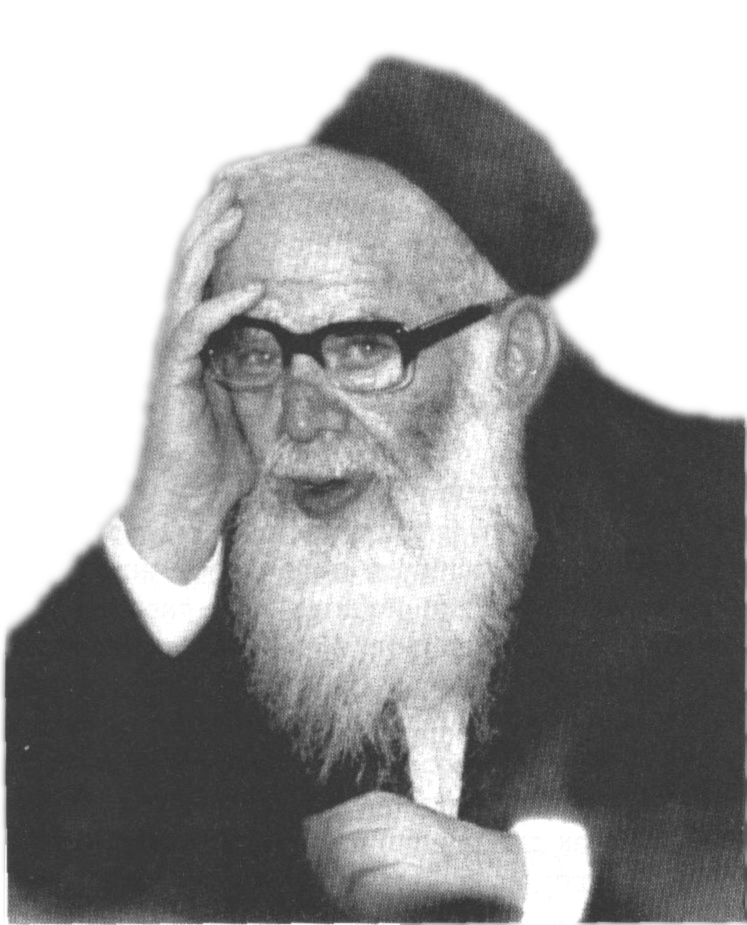How was is it possible for a maggid shiur from the Grodna Yeshiva to connect with American yeshiva bochurim in Yeshivas Mir? Why did an accomplished rosh yeshiva, known for his 12-hour consecutive learning, call himself a batlan? How can it be that someone who knew every shitas Rishonim in Taharos could say shmussen so brilliantly simple that even children could understand his messages?
Those who were fortunate to know Rav Chaim Leib Shmulelevitz zt”l knew it was possible. Born in Kovna, a grandson of the Alter of Novardik, Rav Chaim was nurtured in his youth with Torah and mussar. Orphaned from both parents at a young age, he took to his rabbeim, Rav Shimon Shkop; his father-in-law, Rav Eliezer Yehuda Finkel; and the mashgiach, Rav Yeruchem Levovitz. He grew from their Torah and mussar, and developed his own style, drawing hundreds of talmidim to his greatness in Torah. After escaping the war through Shanghai, he briefly stayed in America before continuing onto Eretz Yisroel, where he became the rosh yeshiva of Mir. Rav Chaim was niftar on 3 Teves, 5739.
I had the zechus of talking with Rav Yerachmiel Chusid, former maggid shiur in Yeshivas Mir Yerushalayim, and rosh chaburah in Bais Medrash Govoah. Rav Yerachmiel was a talmid muvhak of Rav Chaim.
Most of what we have from Rav Chaim zt”l is from his sefer Sichos Mussar, his shmuessen. Tell us a little about his shmuessen.
One thing we all noticed about Rav Chaim was that before he gave any shmuess, he would pause quietly for about a minute. We wondered why he did that. He always came prepared, and had mastered his content and delivery before he gave a shmuess. Rav Shlomo Wolbe zt”l explained his custom. “Before he gave mussar to talmidim, he wanted to make sure that he was holding on that level himself. He would not tell talmidim mussar before working on that specific nekudah. His mussar included every aspect of middos and Yiddishkeit, hakoras hatov, achrayos, avodas Hashem, and tefillah. Whatever it was, he wouldn’t say it unless he was holding there himself.” Rav Chaim was the epitome of an ish emes and lived the ideals he taught. During the years the yeshiva was in Shanghai, he accepted the financial achrayos of the yeshiva with moser nefesh. It was a federal crime in Shanghai to exchange foreign currencies. Rav Chaim was constantly in danger of his life, yet he accepted that achrayos, and was ready to give his life for it. When he spoke about achrayos, it was with firsthand knowledge of the middah.
When talmidim saw Rav Chaim in yeshiva, what would gain from watching him?
His hasmodah was norah noraos! He was brilliant, and he knew everything. Yet the amazing thing about him was that he did not rely on his brilliance. He chazzered and chazzered, hundreds of times. During the day, he had six chavrusos, each for two hours. Each chavrusa was learning a different masechta, none of them the same as the yeshivishe masechtos on which he said shiur. He prepared his shiurim on Shabbos. He had one chavrusa on Shabbos, and learned 12 hours straight. He learned with his cousin, Rav Mordechai Jofen.
He kept pushing himself to learn more. During his later years, I observed him on a Shabbos afternoon in the partially empty Mir beis medrash. He was sitting toward the front, and I was sitting behind him. I heard him talking to himself: “Chaim, vus is mit deer? A mul hustu gelerent azai fleisgig! Yetz hustu gevoren a batlan!” “Chaim, what happened to you? You used to learn with such enthusiasm! Now you are a batlan!” This was during the stretch when he was learning almost the entire Shabbos!
Tell us a little about Rav Chaim’s middos.
His kavod for others was unparalleled. My wife’s uncle, Rav Yitzchok Grizalsky, was Rav Chaim’s rebbi in cheder. Towards the end of his life, his wife was niftar and he moved to Eretz Yisroel. Rav Chaim took him as a chavrusa out of hakoras hatov for the Torah he taught him many years back. He also arranged for his son-in-law, Rav Nochum Partzovitz, to learn with him. When Rav Grizalsky was niftar, I asked Rav Chaim if the levayah could start at Yeshivas Mir, and naturally, Rav Chaim agreed. He then insisted that he would say a hesped. He sent me to go to my uncle, Rav Bentzin Brook, a Novardiker talmid, and instructed me, “Ask him in my name to say a hesped.”
Rav Dovid Lipschutz, Suvalker Rov, was in Eretz Yisroel at the time, and Rav Chaim sent me on the same shlichus to him as well. The morning after the levayah, Rav Meir Shmulevitz, Rav Chaim’s son, came to me with a message from his father, asking that I come see him. After I entered his office and sat down, Rav Chaim said, “Tell me, did I speak well at the levayah? Should I have spoken longer? Should I have arranged more maspidim?”
Some of my chaveirim from yeshiva who went out into the workplace years ago told me the following observation. They came across different types of people in the world of business. Some people seemed like bnei Torah on the outside, but when you dealt with them, you realized you’d better watch your wallet. But when dealing with Rav Chaim’s talmidim, you never had to worry. They would always leave parnossah for you. Rav Chaim’s middos of emes and kavod chaveirim were so strong, that his talmidim naturally imbibed them. He was so careful with everyone. This is what we all gained from the rosh yeshiva.
Who were his rabbeim?
He was especially close to Rav Yeruchem, the Mirrer mashgiach. Rav Chaim once asked the mashgiach why he deserved the extra closeness, and Rav Yeruchem explained, “It is in the zechus of your father. When I was on my way to Mir to accept the position as mashgiach, I passed through Stuchin, where your father was rosh yeshiva. You father asked me where I was headed, and I responded that I was going to Mir to accept the position of mashgiach. Your father then asked me if instead of going to Mir, maybe could I stay in Stuchin and be the mashgiach in his yeshiva. Rav Leib Chasman was there at the time serving as mashgiach, but your father wanted another mashgiach to increase the level of mussar in the yeshiva. I asked your father what he could give me for compensation if I accepted the position. He responded, ‘I don’t have much. All I have is this one shirt. I’ll give you my shirt off my back if you agree to be the mashgiach here in Stuchin.’ (Rav Yeruchem declined the offer, and continued on to Mir.)”
Rav Yeruchem looked at Rav Chaim and exclaimed, “Your father was willing to give his shirt off his back just to have more mussar in his yeshiva! That’s the reason why I am mekarev with you more than the other talmidim!”
Can you describe Rav Chaim’s youth?
Both his parents were niftar by the time he was in his teens, and he had to work to support his family. Rav Shimon Shkop realized the potential of this brilliant bochur, and he took him at age 19 to Grodna, appointing him as a maggid shiur. After seeing that their new rebbi was a young, clean shaven orphan, the bochurim protested. Rav Shimon explained to them: “First, your new young rebbi knows a thousand times more than I knew when I was his age. Second, the ahavas hatorah he will teach, you cannot learn from anyone else!”
One of the prized talmidim of Grodna, Rav Shmuel Rozovsky, rosh yeshiva of Ponovezh, learned under Rav Chaim during his short time as maggid shiur.
Rav Chaim left Grodna a few years later to learn in Mir under the rosh yeshiva, Rav Eliezer Yehuda Finkel. He immediately stood out for his brilliance and hasmodah, along with his tremendous cheishek for Torah. Rav Lazer Yudel chose him to be a chosson for his daughter. After his engagement, Rav Chaim returned to Grodna, where he continued developing his mehalech halimud under Rav Shimon. He set himself apart from all other bochurim in the yeshiva, and became known as a tremendous masmid. He learned bechavrusah with Rav Yisroel Gustman zt”l during this time. They learned from midnight until four in the morning. Rav Chaim was a “chozer” of Rav Shimon’s shiur, saying it over to the younger bochurim who may not have understood it. In fact, the sefer of Rav Shimon’s printed shiurim, Chiddushei Rav Shimon Al Hashas, was based upon Rav Chaim’s notes.
Were you able to understand and gain from his genius in learning?
When he said a shiur kloli, we sat with our mouths open, wondering, “How can a person know so much?” We realized during his shiurim that Rav Chaim knew everything. There was not a part of Torah he did not know perfectly.
Once, Rav Nochum went to America, and Rav Chaim said the blatt shiur in his stead. He introduced the shiur by saying, “I will give a blatt shiur, but not Rav Nochum’s blatt. His blatt, I don’t know!” He understood that his son-in-law Rav Nochum had a different mehalech halimud, and he didn’t want to encroach on his style.
During his chaburos, he was very organized. He said a few questions, an answer, and a proof. He was extremely clear. He knew exactly what he was going to say before he said it. In fact, everything he said in public, he committed to writing down, including his shiur kloli, chaburos and shmuessen. He was very clear, but the expanse of his knowledge in Torah blew our minds. Only the talmidim who were very big talmidei chachomim were able to grasp everything he said. His son Rav Refoel zt”l was a big talmid of his father, as is ybl”c his son Rav Meir. They are both talmidei chochomim and beki’im in Shas.
One time during shiur, he confused two shitos, and no one realized. He continued saying his shiur until he realized his own mistake, and started crying. “Shichechas hatorah! I am forgetting my learning!”
Rav Aryeh Finkel zt”l, rosh yeshiva of Mir Brachfeld, learned with Rav Chaim bechavrusah for 20 years. He related that once, in his older age, Rav Chaim asked him for a Gemara Kesubos. When he retrieved it for him, Rav Chaim broke out in tears. “This is the first time in 25 years that I need to look up a Gemara in Noshim or Nezikin!” We have no comprehension of the wealth of his Torah knowledge.
How did he impact Yeshivas Mir?
Most of the talmidim in Mir gained their learning mehalech from Rav Nochum. But his talmidim were talmidim of the shmuessen. He put a tremendous amount of effort into teaching his talmidim to internalize the lessons he worked his whole life to achieve. “You are not the only one in the world! There are other people! Think about them,” he would say. We still don’t know how he, a brilliant talmid chochom who grew up next to the gedolei olam of the previous generation, was able to impart his values into us American bochurim, but as one talmid said, “Devorim hayotzim min halev nichnosim el halev.” He made us who we are.








